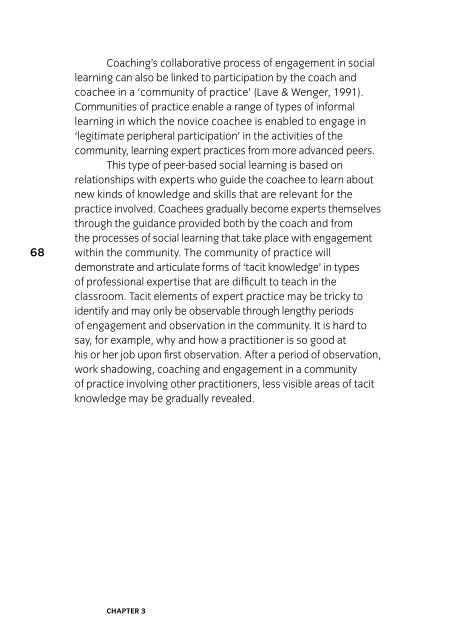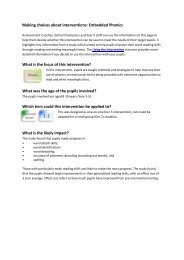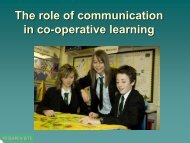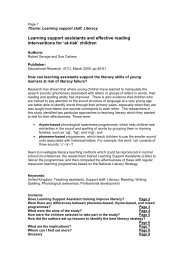the role of coachIng In vocatIonal educatIon and traInIng
the role of coachIng In vocatIonal educatIon and traInIng
the role of coachIng In vocatIonal educatIon and traInIng
You also want an ePaper? Increase the reach of your titles
YUMPU automatically turns print PDFs into web optimized ePapers that Google loves.
68<br />
Coaching’s collaborative process <strong>of</strong> engagement in social<br />
learning can also be linked to participation by <strong>the</strong> coach <strong>and</strong><br />
coachee in a ‘community <strong>of</strong> practice’ (Lave & Wenger, 1991).<br />
Communities <strong>of</strong> practice enable a range <strong>of</strong> types <strong>of</strong> informal<br />
learning in which <strong>the</strong> novice coachee is enabled to engage in<br />
‘legitimate peripheral participation’ in <strong>the</strong> activities <strong>of</strong> <strong>the</strong><br />
community, learning expert practices from more advanced peers.<br />
This type <strong>of</strong> peer-based social learning is based on<br />
relationships with experts who guide <strong>the</strong> coachee to learn about<br />
new kinds <strong>of</strong> knowledge <strong>and</strong> skills that are relevant for <strong>the</strong><br />
practice involved. Coachees gradually become experts <strong>the</strong>mselves<br />
through <strong>the</strong> guidance provided both by <strong>the</strong> coach <strong>and</strong> from<br />
<strong>the</strong> processes <strong>of</strong> social learning that take place with engagement<br />
within <strong>the</strong> community. The community <strong>of</strong> practice will<br />
demonstrate <strong>and</strong> articulate forms <strong>of</strong> ‘tacit knowledge’ in types<br />
<strong>of</strong> pr<strong>of</strong>essional expertise that are difficult to teach in <strong>the</strong><br />
classroom. Tacit elements <strong>of</strong> expert practice may be tricky to<br />
identify <strong>and</strong> may only be observable through lengthy periods<br />
<strong>of</strong> engagement <strong>and</strong> observation in <strong>the</strong> community. It is hard to<br />
say, for example, why <strong>and</strong> how a practitioner is so good at<br />
his or her job upon first observation. After a period <strong>of</strong> observation,<br />
work shadowing, coaching <strong>and</strong> engagement in a community<br />
<strong>of</strong> practice involving o<strong>the</strong>r practitioners, less visible areas <strong>of</strong> tacit<br />
knowledge may be gradually revealed.<br />
Conclusion<br />
The main benefit <strong>of</strong> incorporating coaching practices in o<strong>the</strong>r<br />
approaches to VET is that coaching provides vocational students<br />
with a local, tailored <strong>and</strong> flexible relationship with a more<br />
expert peer using a robust model that has been shown to have<br />
high levels <strong>of</strong> impact (Ketelaar et al., 2009). Coaching allows<br />
learners to reflect on <strong>and</strong> participate actively in <strong>the</strong> development<br />
<strong>of</strong> <strong>the</strong>ir own knowledge <strong>and</strong> underst<strong>and</strong>ing. The development<br />
<strong>of</strong> more advanced practice takes place as students learn how to<br />
direct <strong>and</strong> regulate <strong>the</strong>ir own learning, striving for individualised<br />
goals <strong>and</strong> higher achievement.<br />
As an approach that aims to help people to learn for<br />
<strong>the</strong>mselves under <strong>the</strong> close guidance <strong>of</strong> an expert, <strong>the</strong> <strong>role</strong> <strong>of</strong><br />
coaching naturally fits in with a range <strong>of</strong> o<strong>the</strong>r approaches in<br />
VET. Coaching complements classroom teaching <strong>and</strong> workshop<br />
delivery by providing a learner-focused approach in which<br />
students learn through experience in real-world situations. This<br />
naturally complements VET classroom <strong>and</strong> workplace<br />
demonstration practices. As a socio-cultural <strong>and</strong> cognitive<br />
apprenticeship-type pedagogical approach that fosters<br />
both independence <strong>and</strong> self-directed learning, coaching involves<br />
students working in partnership with expert coaches in <strong>the</strong><br />
vocational field involved.<br />
The development <strong>of</strong> more advanced practice occurs as<br />
students learn how to direct <strong>and</strong> regulate <strong>the</strong>ir own learning.<br />
<strong>In</strong> striving for individualised goals <strong>and</strong> higher levels <strong>of</strong> achievement,<br />
coachees benefit directly from engagement with a coach. To<br />
achieve <strong>the</strong> best from <strong>the</strong> relationship, an atmosphere <strong>of</strong> trust<br />
between coach <strong>and</strong> coachee needs to be established in which<br />
both parties respect <strong>the</strong> skills <strong>and</strong> knowledge <strong>of</strong> <strong>the</strong> o<strong>the</strong>r. Both<br />
parties need to be committed to an interactive relationship<br />
which involves a subtle balance <strong>of</strong> power, in which <strong>the</strong> authority<br />
<strong>of</strong> <strong>the</strong> coach is respected, but <strong>the</strong> coachee is also valued for<br />
his or her skills <strong>and</strong> potential. To motivate <strong>the</strong> coachee, <strong>the</strong> coach<br />
69<br />
CHAPTER 3<br />
The <strong>role</strong> <strong>of</strong> coaching in vocational education <strong>and</strong> training







